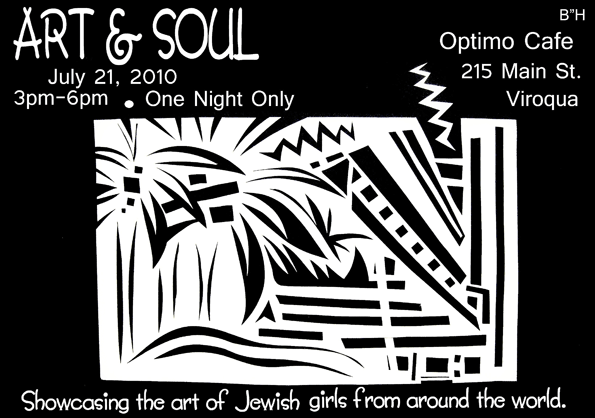(lubavitch.com) On a recent Wednesday afternoon in rural Viroqua, Wisconsin, visitors to the Optimo Cafe browsed Art and Soul, an exhibit of works by Jewish teenagers in the process of self-discovery.
Viroqua, on a ridge in the Ocooch Mountains of Southwestern Wisconsin, is 50 miles from the nearest Jewish community, an unlikely venue for a study of Jewish themes. But the juxtaposition added contrast and interest to the exhibit, piquing the curiosity of visitors who took the time to read the accompanying descriptions, and talk to the young artists.
When the Jewish Un-Camp reconvened this July to host 50 Jewish teenage girls from around the globe, no one could have anticipated how critical its art program, led by instructor Aarah Aizman, would prove to the success of the program.
Fifteen-year old Mara Tzizek from Ipswich, MA, said the open studio was integral to her Un-Camp experience, where “everyone’s personality is changing, learning, growing so much.”
The studio, she explains, became a space that allowed her to express herself after spending full days in intense classes where she grappled with questions that went to the heart of her identity.
A division of Bais Chana International, a women’s institute for Jewish study and exploration, the Jewish Un-Camp draws teenage girls to Campus Basi Le Gani, where, hidden away in a remote, pastoral and idyllic setting in rural Wisconsin, they study and examine their own relationship to their Jewish heritage.
This year, the open art studio made its debut. With the equivalent of two carloads worth of art supplies and a barn loft-turned-studio space whose doors remained open from dawn until dusk, the open studio became the perfect place for girls to explore their own identities as they worked on their developing creations.
Instructor Aarah Aizman who has been teaching Art at the Torah Academy Jewish Day School in Minneapolis for the past 12 years, concurs. “Art is a new medium for understanding life and facilitates self-identity.”
Through experimentation with a variety of art media and materials the girls explored Jewish history and its relationship to their own lives. They reviewed the Biblical description of the building of the Tabernacle, exploring the use of silver, copper, scarlet, turquoise and other materials in its construction. The teenagers considered the unique qualities of the various raw materials and took personal life lessons in seeing how each contributes to the whole.
Vashti Aguilar, 18, from Bolingbrook, IL was originally turned on to Bais Chana when her older sister attended Snorkel ‘n’ Study, a Bais Chana program for college-age Jewish women. She attended a Shabbaton at Bais Chana and was inspired to join the Jewish Un-Camp where the art program “played a huge part in discovering my Jewish roots.”
Impressed by how strongly the teenagers took to the open studio, Scharfstein rushed to organize an art exhibit in the nearest town. She soon secured a venue in the newly renovated Optimo cafe in Viroqua, and a date was set for the exhibit.
Mara, Vashti and Galya, 15, who traveled from Costa Rica to join the camp, loved the idea. “We were so excited to be able to show our art to people in Wisconsin,” said Mara.
On exhibit day, two busloads of girls joined Rabbi Manis Friedman, Dean of Bais Chana, and prinicipal lecturer for the Un-Camp. When he spoke, Vashti had internalized Rabbi Friedman’s words of wisdom and offered to summarize: “Art is everywhere. Moshe went half way up the mountain and G-d came half way way down. Art is bringing the spiritual and physical together. Every mitzvah is an exercise of art.”
Executive Director Hinda Leah Scharfstein says that the art segment of the Un-Camp was vital to cultivating the girls’ self-confidence, and the exhibit, “a crazy thing to pull off in one week,” nevertheless gave them the “opportunity to reach out and share this with other people in Viroqua.”
“We don’t know what ripple effect it will have on the town,” says Scharfstein. But of one thing she is certain: “Art has given these girls the ability to make what they’re learning very much grounded.”
Vashti agrees. ”I never thought I had it in me. I never even attempted to make something so real.”

Be the first to write a comment.